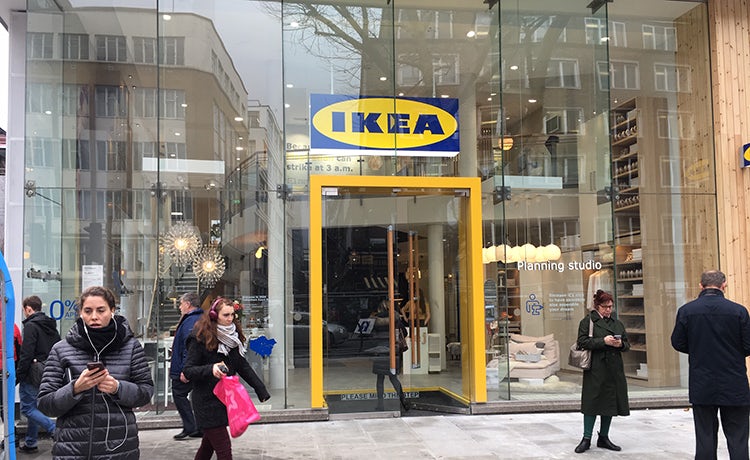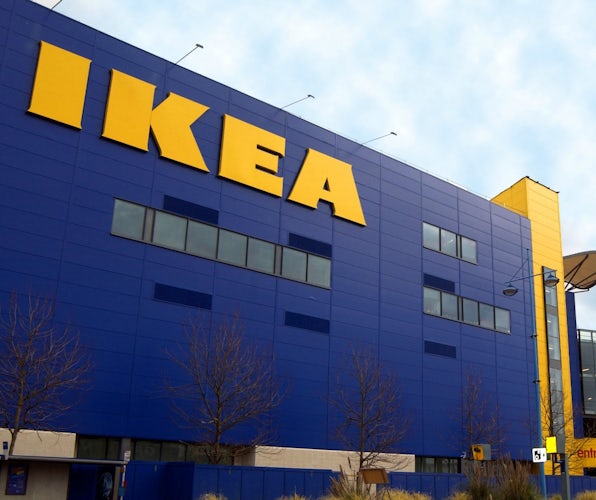Ikea’s foray into the rental economy shows a brand firmly on the front foot
If Ikea’s seven decades in interiors has taught it anything, it’s that you’ve got to move with the times or get left behind.

For a company that has been operating for more than seven decades, Ikea certainly has a clever knack of staying ahead of the game.
The 76-year-old Swedish furniture giant is poised to make its first foray into the rental economy with a pilot project leasing office furniture to businesses in Switzerland. Based on the success of the pilot, the subscription model could be extended other Ikea products from kitchens to sofas.
Customers, whose concept of ownership is evolving in an economy increasingly focused on renting, may then be able to trade a leased product in for something new to update their home. This would prolong the product lifecycle, as once the lease is up Ikea could refurbish the used piece and sell it on.
Of course this idea is nothing new. Ikea is following in the footsteps of US startups like subscription furniture rental company Feather Furniture or Burrow, which leases sofas in a choice of three sizes and five colours. It is, however, the first mass market interiors brand to take the rental economy seriously.
READ MORE: The changing nature of ownership – How brands are catering for ‘generation rent’
Speaking to the Financial Times, Torbjorn Lööf, chief executive of Inter Ikea, the holding group that owns the Ikea brand, discussed the value of the company adopting a “circular model”. There are plans, for example, to introduce a spare parts business for Ikea components no longer in stock, enabling consumers to repair their existing furniture. Shoppers can already return old beds and sofas to some stores for donation to charity.
Ikea’s move into the rental economy fits a wider sustainability agenda as the brand faces up to criticism that its flatpack empire is contributing to throwaway consumerism. The business has set itself some pretty hefty targets for the next couple of years, including a commitment to use only renewable and recycled materials in its products by 2030, cutting the average climate footprint per product by 70%.
Next year, all single use plastics will be phased out of Ikea products and its stores, and the company intends to source 100% of its wood, paper and cardboard from sustainable sources and will ensure that 90% of all waste from its own operations is recycled or energy recovered. Ikea is also hoping to achieve a fourfold increase in sales from products that ‘help people live a sustainable life’.
Ikea has put its money where its mouth is with the launch of its Greenwich store. Opening tomorrow (7 February), it is the first full-sized store to open in the capital in 14 years and has been designed on a sustainable blueprint.
The store features solar panels – expected to provide between 50% and 80% of the store’s energy – rainwater harvesting, geothermal heating, a flexible working area, roof garden and a pavilion space available for hire free of charge by local community groups. There will also be a ‘learning lab’, where shoppers can, among other things, learn how to upcycle old furniture.
Furthermore, Ikea has committed that all 500 members of staff working at the Greenwich store will travel to work via public transport and is offering shoppers living within a three-mile radius the option to have their shopping delivered on the same day via an electric bike courier.
The move into rentals and the eco-focus of the new Greenwich store show Ikea is working hard to challenge perceptions that just because its furniture is affordable it is inherently disposable.
Shift to convenience
Aside from the sustainability angle, Ikea’s move into the rental market is the latest example of the company’s wider shift towards convenience. Last year, the retailer unveiled its Planning Studio on London’s Tottenham Court Road, following the success in 2017 of its pop-up kitchen showroom in Stockholm, and bedroom showroom and accessories store in Madrid.
Designed to help shoppers plan larger-scale home projects, such as a new kitchen or bedroom, the Planning Studio is the first step in the retailer’s ‘revised strategy’ to bring Ikea to the heart of urban areas. These plans roll on to Paris, where a 5,400 square metre city centre store is scheduled to open in May.
Javier Quiñones, Ikea UK and Ireland country retail manager, has described this city centre approach as the company’s response to the “fast-changing retail environment”, representing a real effort to “remain relevant in the eyes of consumers – now and in the future.”

Part of this drive to stay relevant has seen Ikea ramp up its partnerships with high-profile brands such as Lego, Adidas and food delivery service Uber Eats. In November, the retailer offered Uber Eats customers in London three limited edition set menus of food normally served at its restaurants (priced between £10 and £20), matched with a selection of Ikea products such as scented candles, napkins and wine glasses.
This desire for relevancy has also powered Ikea’s innovations in affordable smart home products. In 2017, the company launched a range of smart light bulbs operated by remote or smartphone app, which will be followed this spring by the introduction of smart blinds that open and close via wireless remote or voice command.
READ MORE: Ikea shifts marketing strategy to focus on product innovation rather than rooms
Investment is also being ploughed into improving the seamlessness of Ikea’s online offering. This is a smart move given that for the year to 31 August 2018 visits to the Ikea website rose by 13.4% to 199.3 million. During this period online sales grew by 14.4%, to the point that they now represent 15.5% of Ikea’s total sales.
In addition, the Swedish retailer has been savvy enough to invest in its backend distribution with the establishment of two new customer delivery centres and a parcel unit in London, resulting in a 65.9% increase in UK parcel deliveries.
Ikea is, however, aware that the shift to convenience comes at a cost. In May, the company pulled out of a proposed multi-million pound large format store in Cuerden, Lancashire. Due to open in 2020 with the creation of 350 jobs, Ikea claimed the site was “no longer viable”. Then in November the company confirmed that over the next year 350 roles across its 12,100 strong UK and Ireland workforce were at risk of redundancy.
While it has to weight up the costs and benefits, relevancy remains right at the heart of Ikea’s overall strategy. Whether it is leasing furniture to renters, opening city centre locations, investing in affordable smart tech or making its meatballs available on Uber Eats, the Swedish furniture giant is clearly a business that relishes change.
To be clear this is not change for change’s sake, but rather a strategic shift in line with consumer behaviour that suggests Ikea is even prepared to rip up its own rulebook to stay ahead of the game.







